ISSUE NO. 15: COVID CULTURAL REACTIONS WORLDWIDE – A VIEW FROM BEHIND THE HEADLINES
News & Notes

Acorn International
1702 Taylor St, Suite 200B
Houston, TX 77007, USA
1213 Purchase St
New Bedford, MA 02740, USA
Mar 23, 2020 | Notes
We’ve been in touch with our on-the-ground partners in >50 such countries to make sure they, their families and their teams are ok, and we asked them: “what one thing have you noticed that stands out as most interesting about your culture in response to the pandemic?” Here’s a quick summary of what we heard back:
Our partners in Africa and Asia told us that many in their counties find it difficult to accept and abide by social distancing practices that are far away from our habits and culture, despite awareness of health risks. From Malawi to Colombia to Indonesia, we are told that people are finding it very difficult to put aside traditional handshakes and embraces in the interest of limiting the spread of a disease that they may not yet be taking seriously.
Those living in high-density settlements lacking basic sanitation are starting to panic as they become more aware of the pandemic risks. From Namibia to Nicaragua, for example, we’ve heard that while middle and upper income sectors are able to readily practice recommended precautions, the urban and rural poor have limited options – highlighting the differences between those who have resources and those who do not.
We heard a telling quotation from Ghana about the elite in some of these countries. “Gone are the days when Ghanaians showed off with ‘I just came back from the UK, US, Spain, or I just got back from Paris!’ Try bragging now and get QUARANTINED with immediate effect!”
Many of the poorest in least developed nations are turning to their faith for answers and protection vs the pandemic. In Bangladesh, many are flocking to crowded prayer services where they may be at greater risk of contagion. (There are reports of some imams telling their followers that the disease will not harm them because they are Muslims.) From rural Cameroon we heard of pervasive faith in traditional medicine and lifestyles as preventative. But from Senegal we heard of voluntary popular efforts to rearrange spiritual practices to build bridges with government instructions to take precautions.
Reactions to government response are varied. From West African partners, for example, we heard about alarm over the extent to which governments lack capacity to respond. From Latin America’s Southern Cone country partners, we heard competing concerns ranging from highlighted government incompetence to surprising levels of increased support across political interest groups. From partners living in autocracies of Africa and Latin America, we heard that “the good thing about a dictatorship is that people follow the rules.” Despite these differences, across the board our partners reported notable shifts in either public support or public criticism of their political establishment.
From outcries in Israel over the violation of rights by government-coordinated mobile device tracking to monitor and manage contact (now being practiced and considered in other countries) to suspicions that unstable governments in South America are taking advantage of the risk to over-reach with self-benefiting controls – the balance of preserving human rights and preserving public health is being challenged across the globe.
We’ll continue to check in with our partners, clients and friends in the least developed countries – those that aren’t making prime-time headlines here in the US – to give them support during this time of growing crisis, and to continue to learn more deeply how unique cultural beliefs will influence their present courses of common action and their hopes for the future. We’ll report back as we continue to learn more – and we welcome your feedback and engagement.
Acorn International LLC delivers social and environmental risk management consulting services to the extractive industries and investors worldwide. We work with local partners in over 70+ countries worldwide. Use of these local specialists is paramount, particularly in developing countries, where information is often scarce, second-hand, and unreliable. We look forward to engaging in continuous improvement for the industry and building capacity with our partners.
| Cookie | Duration | Description |
|---|---|---|
| cookielawinfo-checkbox-analytics | 11 months | This cookie is set by GDPR Cookie Consent plugin. The cookie is used to store the user consent for the cookies in the category "Analytics". |
| cookielawinfo-checkbox-functional | 11 months | The cookie is set by GDPR cookie consent to record the user consent for the cookies in the category "Functional". |
| cookielawinfo-checkbox-necessary | 11 months | This cookie is set by GDPR Cookie Consent plugin. The cookies is used to store the user consent for the cookies in the category "Necessary". |
| cookielawinfo-checkbox-others | 11 months | This cookie is set by GDPR Cookie Consent plugin. The cookie is used to store the user consent for the cookies in the category "Other. |
| cookielawinfo-checkbox-performance | 11 months | This cookie is set by GDPR Cookie Consent plugin. The cookie is used to store the user consent for the cookies in the category "Performance". |
| viewed_cookie_policy | 11 months | The cookie is set by the GDPR Cookie Consent plugin and is used to store whether or not user has consented to the use of cookies. It does not store any personal data. |